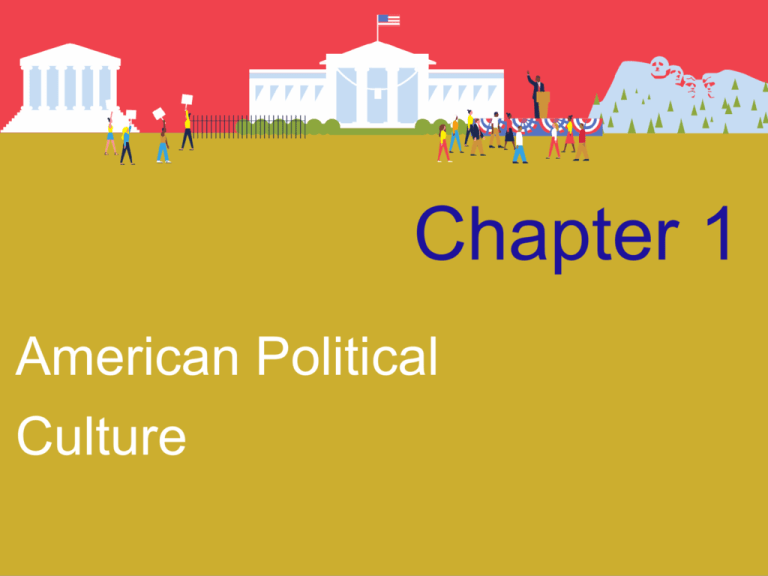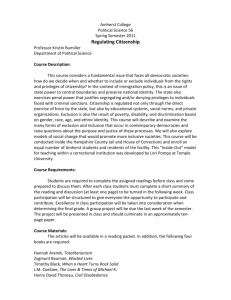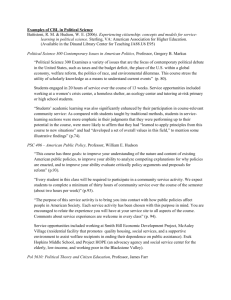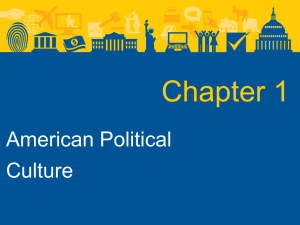File - Auzenne's Government Course Site
advertisement

Chapter 1 American Political Culture Warm up • • • • • Efficacy Autocracy Totalitarianism Authoritarianism Knowledge necessary for engaged citizenship… What Americans Think about Government • Americans expect a lot from their government. – Keep us safe and yet protect individual liberty and privacy. – Support the weakest and yet keep taxes low. – Sustain a healthy environment and still promote business growth. – Keep government small, yet handle each crisis quickly and effectively. What Americans Think about Government: Level of Trust Do you trust government to do the right thing? What Americans Think about Government: Importance of Trust Does it matter if Americans trust their government? • Yes • American government is predicated on a citizenry that: – is informed and active, – keeps leaders aware of their preferences, and – holds elected officials accountable at elections. • Trust is a prerequisite to engaged democracy. What Americans Think about Government: Political Efficacy What is political efficacy? • Political efficacy is the belief that one has the ability to influence what government does. – 1960: 25 percent of those polled said elected officials didn’t care what citizens like themselves thought – 2014: 78 percent thought the same Political Efficacy Citizenship: Knowledge and Participation • Political Knowledge – People will not believe they can affect government if they don’t know much about it. • Americans are not very knowledgeable about their government. – In a 2013 survey, only 28 percent of respondents could identify Justice Anthony Kennedy as the Supreme Court’s swing vote. Citizenship: Knowledge and Political Engagement • Citizenship: derived from the Greek ideal, refers to “enlightened political engagement.” – This entailed public discussion, debate, and activity designed to improve the community. – Citizens must be aware of the facts and what can be done about a situation, and they must be willing to take action to solve community problems. Citizenship: Knowledge and Participation: Necessity of Political Knowledge • Necessity of Political Knowledge – Citizens must understand how politics works if they are to shape outcomes. – Knowledge of the process must extend far beyond names and dates • Citizens need political knowledge to understand what they can expect of their government. Citizenship: Knowledge and Participation: Digital Citizenship Digital Citizenship • Digital citizenship is the ability to participate in society online, and it is increasingly important in politics. – In fact, 75 percent of Americans read the news online and more than 6 in 10 look up political information online. – A full 67 percent visit a local, state, or federal government website. Citizenship: Knowledge and Participation: How the Federal Government Affects Our Lives What Americans Know about Government Is Government Needed? • Government is needed to provide “public goods.” – Public goods are goods that benefit everyone but that no individual or group on its own can afford to supply: • • • • defense against foreign aggression, maintenance of public order, a stable currency, and so on. Who Governs? What are some forms of government? • Autocracy: government by a single, nonelected leader (e.g., a king, queen, or dictator). • Oligarchy: government by a small group that is not accountable to the citizens (e.g., military officers or landowners). • Democracy: a system of rule that permits citizens to play a significant part in the governmental process, usually through the election of key public officials. Limits on Government Power: totalitarian, authoritarian, and constitutional • Totalitarian governments recognize no limits on their authority. • Authoritarian governments recognize no limits on their authority, but they are constrained by other institutions, such as business or a church. • Constitutional governments are limited both in what they can do (substantive limits) and the methods they can employ (procedural limits). Forms of Government: John Locke Forms of Government: John Stuart Mill Politics • Politics: conflict over the leadership, structure, and policies of governments. – Representative democracy (republic) • Governments are run by elected officials who represent the interests of their constituents. – Direct democracy • Citizens themselves vote on all legislation. – town meetings, referenda Pluralism • Groups and organized interests also participate in politics. – Groups and organized interests provide funds for candidates, lobby, and try to influence public opinion. – The pattern of struggles among interests is called group politics, or pluralism. Who Are Americans? • The United States has grown in population from 3.9 million in 1790, the year of the first official census, to 318 million in 2014. • The government sets policy to determine whom it allows in and who is eligible for citizenship. • This decision is highly political and has changed many times over the course of American history. Immigration and Ethnic Diversity Who Are Americans?: Citizenship U.S. Citizenship: • The first census did not count Native Americans (in fact, it was not until 1924 that Native Americans could become citizens). • Most people of African descent were not officially citizens until 1868, when the Fourteenth Amendment to the Constitution conferred citizenship on the freed slaves. Who Are Americans?: Immigration Policy Immigration Policy: • Immigration policy has been historically biased against nonwhites. – Until 1870, only free whites could become naturalized citizens. – The Chinese Exclusion Act of 1882 outlawed the entry of Chinese laborers into the United States. Who Are Americans?: Native Americans Who Are Americans?: Twenty-First Century • Twenty-First-Century Americans – By 1965, Congress lifted strict immigration limits set in place in the 1920s. – This resulted in new waves of immigration from Asia and Latin America. • 2012 Population (U.S. Census) – White: 63 percent – Asian: 5 percent – Black: 13 percent – Latino: 17 percent Twenty-First Century Americans Who Are Americans?: Continent of Origin Immigration by Continent of Origin (1900–2008) Who Are Americans?: Age Distribution • The age distribution of the population can have a profound impact on politics. – Different age groups have very different needs for public services. – Different age groups vote differently. American Political Culture If Americans do not share a common blood line or religious or ethnic heritage, what unites the nation? • Political culture • American political culture emphasizes the values of: – Liberty – Equality – Democracy American Political Culture: Liberty • Liberty: freedom from government control. This includes: – Personal freedom – Economic freedom • Linked to the concept of “limited government.” American Political Culture: Equality • Equality – Equality of opportunity – Equality of outcome – Political equality American Political Culture: Democracy • Democracy – People choose their rulers and have some say over what those rulers do. – When ultimate power rests with the citizenry, this is called popular sovereignty. – In America, the people are sovereign and majority rules, but the individual rights of the minority are still protected. Equality and Public Opinion Public Opinion Poll: Q1 How much would you say the work and decisions of the federal government affect what happens in your life? a) b) c) d) e) Not at all A little A moderate amount A lot A great deal Public Opinion Poll: Q2 Do you believe our government should do more, the same, or less for the citizens of our country? a) b) c) d) More About the same Less No opinion Public Opinion Poll: Q3 How much of the time do you think you can trust the federal government to do what is right and fair? a) b) c) d) Just about always Most of the time Only some of the time Never Public Opinion Poll: Q4 How much do you feel public officials care what people like you think? a) b) c) d) e) A great deal A lot A moderate amount A little Not at all Public Opinion Poll: Q5 How much do you feel people like you can affect what the government does? a) b) c) d) e) A great deal A lot A moderate amount A little Not at all Public Opinion Poll: Q6 How interested are you in information about what is going on in government and politics? a) b) c) d) e) Extremely interested Very interested Moderately interested Slightly interested Not interested at all Public Opinion Poll: Q7 How often do you pay attention to what is going on in government and politics? a) b) c) d) e) Never Once in a while About half the time Most of the time All the time Additional Information Following this slide, you will find additional images, figures, and tables from the textbook. Federal Student Aid Website Table 1.1: The Presence of Government in the Daily Life of a Student at “State University” Political Knowledge and Trust in Government Table 1.2: What Americans Know about Government Diversity of U.S. Population Immigrants Being Processed Public Opinion Poll Figure 1.4: Income in the United States Students in a Library Occupy Demonstrator Voters in a Polling Place







